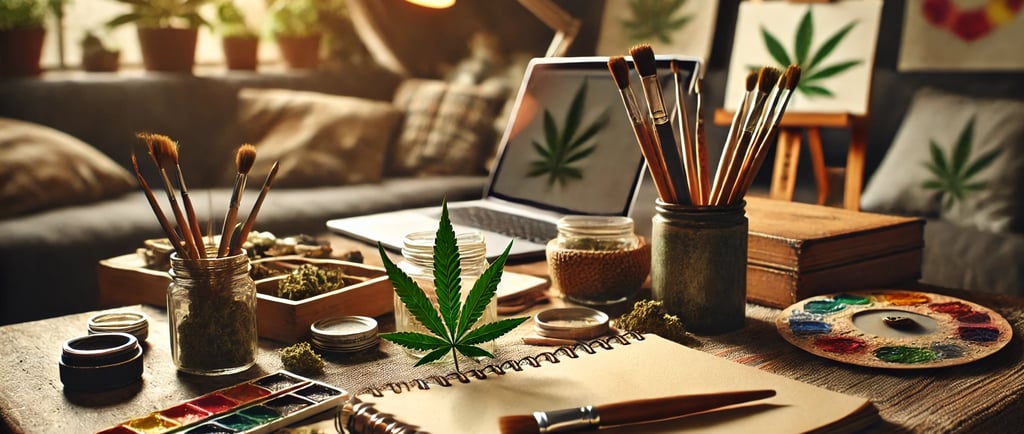The Relationship Between Cannabis and Creativity: Studies and Testimonials
Cannabis has long been associated with creativity, with many artists, musicians, writers, and thinkers claiming it enhances their creative processes. From promoting relaxation to helping individuals think "outside the box," cannabis is thought to aid in breaking down mental barriers and stimulating original ideas. But is there scientific evidence to support these claims? In this article, we’ll explore the research on cannabis and creativity, along with testimonials from individuals who believe it has positively influenced their creative expression.
CANNABIS GUIDE
11/4/20244 min read


Understanding Creativity and the Brain
The Neuroscience of Creativity
Creativity is a complex, multifaceted phenomenon that involves various brain regions and cognitive processes. Key aspects of creativity include divergent thinking—the ability to generate multiple ideas—and convergent thinking, which involves narrowing down options to find a single, optimal solution. Creative processes rely on the brain’s default mode network (DMN), which is activated during daydreaming, self-reflection, and idea generation.
How Cannabis Affects the Brain
Cannabis affects the brain through the endocannabinoid system (ECS), which plays a role in mood, perception, and cognition. The active compounds in cannabis, particularly tetrahydrocannabinol (THC) and cannabidiol (CBD), interact with the ECS to alter perception, increase dopamine release, and affect memory and thought patterns. These effects can enhance creativity for some people, helping them see connections or solutions they might not otherwise notice.
Scientific Studies on Cannabis and Creativity
Divergent Thinking and Creativity
A key study in Psychopharmacology (2012) investigated the effects of cannabis on creativity by focusing on divergent thinking. The researchers gave participants either a high dose, low dose, or placebo and measured divergent thinking through tasks like word associations and idea generation. They found that low doses of cannabis slightly improved divergent thinking, while high doses had a neutral or even negative effect on creativity. This finding suggests that small amounts may help break cognitive constraints, whereas high doses may impair thought clarity.
THC, Dopamine, and the Reward System
THC, the psychoactive compound in cannabis, increases dopamine levels in the brain’s reward system, which is linked to enjoyment and motivation. A study from The Journal of Neuropsychopharmacology found that dopamine release under THC’s influence can sometimes improve motivation, particularly in creative pursuits. When people feel rewarded by their creative output, they may be more likely to engage in creative activities and push their limits.
The Role of Personality
Not everyone responds to cannabis in the same way, and individual personality traits play a significant role. A study published in Consciousness and Cognition found that people with high levels of openness to experience, a trait often linked to creativity, were more likely to feel creatively stimulated by cannabis. Conversely, people who are naturally more anxious or have lower tolerance levels might feel less creative or even experience anxiety or disorientation.
Testimonials: Personal Experiences with Cannabis and Creativity
Artists and Musicians
Many artists and musicians have spoken about how cannabis has helped them reach creative breakthroughs. For example, some report that using cannabis helps them overcome creative blocks and allows ideas to flow more freely. Others describe how it enables them to immerse deeply in their work, focusing intensely on each detail without distraction.
Testimonial:
"When I paint after a small dose of cannabis, it’s as if colors and forms connect in a different way. I don’t overthink, and that’s when my best work comes to life." — Clara, Visual Artist
Writers and Poets
Writers often experience “writer’s block,” a state of mental block that makes it hard to come up with new ideas. Some writers find that cannabis helps quiet their inner critic, allowing ideas to emerge without self-judgment. Small doses may help them write in a “stream of consciousness” style, which can be particularly useful in creative writing.
Testimonial:
"Cannabis lets me lose myself in the rhythm of words. It feels as if my mind isn’t holding back; instead, it’s just flowing onto the page without fear." — David, Poet and Novelist
Tech Innovators and Entrepreneurs
While cannabis use is less common in high-stakes fields, a subset of innovators in tech and entrepreneurship have shared that cannabis helps them approach problem-solving from a different angle. In this context, cannabis is seen not as a recreational tool but as a means of enhancing productivity by removing mental barriers.
Testimonial:
"Sometimes, to find the solution, you have to see the problem from an entirely different perspective. A small dose of cannabis can help me think beyond the usual frameworks." — Liam, Software Engineer
Potential Downsides: When Cannabis May Hinder Creativity
While many find cannabis helpful for creativity, it does have potential downsides. High doses of cannabis, especially those with high THC concentrations, can cause issues like:
Reduced Focus: Some individuals find it hard to concentrate, which can interfere with tasks requiring attention to detail.
Memory Impairment: Short-term memory may be affected, making it difficult to retain ideas or work through complex thoughts.
Over-reliance: Some individuals might feel that they can only be creative with cannabis, potentially creating dependence.
A study in Frontiers in Psychology found that high doses of THC, especially in people with lower tolerance levels, led to distraction and mental disorganization rather than creativity. This suggests that while cannabis may aid creativity for some, using it in moderation is crucial.
Recommendations for Those Exploring Cannabis and Creativity
1. Start Small
If you’re considering cannabis to enhance creativity, begin with a very low dose and gauge how it affects your thought process and focus. Avoid the urge to increase doses quickly, as higher amounts of THC may impair rather than enhance creativity.
2. Choose the Right Environment
The environment plays a significant role in how cannabis affects mood and creativity. A quiet, relaxing, and familiar space may be more conducive to creativity than a chaotic or unfamiliar setting.
3. Select Strains Carefully
Cannabis strains vary widely in their effects. Sativa-dominant strains are often associated with cerebral and uplifting effects, while indica-dominant strains tend to promote relaxation. Individuals seeking creativity might experiment with sativa strains known for providing mental stimulation.
4. Consider the Creative Task at Hand
Different creative tasks require different types of focus. For activities that benefit from open-ended, abstract thinking—like painting or brainstorming—cannabis may be beneficial. For tasks that require attention to detail or convergent thinking, such as editing or finalizing work, it might be best to work cannabis-free.
Conclusion: Is Cannabis a Creativity Booster?
The relationship between cannabis and creativity is complex and influenced by factors such as dosage, personality, and the type of creative task. While some studies and testimonials suggest that low doses of cannabis can enhance divergent thinking and help individuals overcome creative blocks, high doses may lead to distraction or impair the ability to focus.
Creativity thrives on exploration and experimentation, and for some, cannabis offers a way to tap into new perspectives and generate unique ideas. However, it’s essential to approach cannabis use thoughtfully and to be aware of one’s limits. For those considering cannabis as a creative aid, moderation, environment, and the right mindset are crucial to reaping potential benefits without compromising the quality of their work.
Ultimately, creativity is a deeply personal process, and while cannabis may serve as a tool for some, others might find alternative methods—like meditation, music, or simply changing their routine—just as effective in fostering their creative flow.
